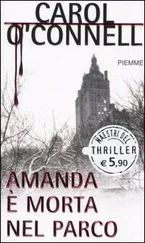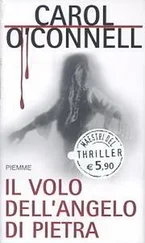“No,” she said. “Berman’s mistakes are really over the top.”
“Yeah,” said Riker, “very stupid mistakes.”
“You’re sure about that?” Mallory slung her knapsack over one shoulder. “Think about it, Riker. Dale was smart enough to fool Markowitz once.” She picked up her car keys, almost ready to leave. “The way I remember it, he fooled you, too.” She leaned close to her partner’s ear to deliver a parting salvo. “And he’s still doing it.”
Agent Nahlman had no idea where Barry Allen had gone. She guessed that he had been reassigned to the gravesite west of this one. Dale Berman effected these separations from her partner all too frequently. Today, he had loaned her out to the state police, demoting her to media control. News vehicles had been turned away from the crime scene and into an area where cameras and lights could be set up. Now came the procession of divas, male and female reporters, to take their positions and deliver live feed on a small grave that they would never be allowed to see. Next, she would be called upon to say “No comment” a hundred times, rephrasing it for the more witless interviewers. Wrangling these bottom feeders and their makeup artists-this was the only thing that Dale was truly good at, but he could not be bothered. No, this was a handmaid’s job.
Nahlman grabbed a passing rookie agent by his sleeve, promoted him to press liaison, and then walked back to the dig site surrounded by state troopers.
Oh, no.
This corpse had flesh. She had become so accustomed to bones, but this child had been mummified in arid ground. It was easy to make out a button nose, a delicate chin-a slashed throat.
Agent Nahlman looked down the road, as if she could see all the way to the restaurant where the caravan parents would be waiting for the news-the name of a little girl. Some had children to fit the victim profile. Many other parents were spread out all over the country, and they were no doubt following the broadcasts, never straying far from their television sets, as this body was unearthed, layer by layer of dirt.
Who would win the phone call today?
Unlike Dale Berman, the local authorities were not inclined to keep the parents in ignorance, and this child would have a decent burial. One of the diggers held up an object cupped in one hand. He was a burly local man and probably had children of his own, for his voice was hoarse when he said, “It’s a locket. Her name was Karen.”
This would not fit any child belonging to a caravan parent. Nahlman knew all their stories now-which missing girl hated asparagus and which one loved baseball more than God. The FBI agent stared at the corpse in the hole.
And whose little girl are you?
A laminated school-bus pass was gently plied from the child’s curled fingers. The bus pass held all the information needed to carry her home.
The caravan had been under way for twenty minutes, and Dr. Paul Magritte was at last feeling at ease. He was more centered now, with many cars between himself and the New York detective in the Mercedes. And the FBI moles were driving at the rear.
The doctor had total privacy.
Eyes on the road, he dipped one hand into his nylon knapsack, fishing blind until his fingers closed upon the photograph of dying April Waylon. He crushed it in his fist. Next, he knocked his pipe from the ashtray, replacing it with the wadded picture. He patted his shirt pockets. Oh, where were his matches? No matter. The car’s cigarette lighter would do as well. A few moments later, he held its glowing tip to the crumpled image of April.
It caught fire, followed by smoke-so much of it. He had never burned one in the car before, and he had not counted on this. His other small fires had been more ceremonial, and those had been set with the flames of votive candles. He batted the air in front of his face. Smoke was slipping past him to his partially opened window. Eyes filled with stinging tears, he dared to open all the windows until, at last, the smoke had cleared and the picture was burnt to ashes.
His eyes were also clearing, and now, in peripheral vision, he noticed another car in the passing lane had come abreast of him and kept pace with him. Through his side window, Paul Magritte glanced at this other driver.
And Mallory looked back at him.
Her head was sharply turned to one side. She was facing him with no thought of the road ahead, and the young detective held this pose for so long-it unnerved him so badly-his hands tightened on the wheel, knuckles whitening. She stared at him for miles and miles.
The campsite was near an abandoned gas station, and one toilet had been promised to be in working condition. However, the owner had not inspected his property in years, and now he renegotiated the amount of money agreed upon one month ago when the trip was first planned. Today’s price, the owner said, was “Not one red cent, and God bless you all.”
This time, the news media had the affair catered with microwave ovens emitting the smell of reheated pizza to lure the campers and federal agents into the interview zone. But best of all, the most enterprising network crew was unloading Port-O-Potties from a flatbed truck-even better bait that neatly solved the problem of the dysfunctional toilet. As each plastic closet was set upon the ground, a waiting line of parents quickly formed in front of it.
A field reporter stood before a stationary camera, preparing to say his new opening line one more time. Yesterday, he had reported from the Road of Lost Children, but today he said, “This is John Peechem reporting from the Road of Graves.” A cameraman pointed out that he was smiling when he said it that time, too. They did a retake with a more somber expression. And then the lens panned a group of young men and women with the letters FBI emblazoned on their jackets. “This hasn’t been confirmed yet,” the reporter said to his microphone, “but the agents might be looking for body parts.”
A less expensive handheld camera pointed at the caravan’s only children. Brother and sister stood hand in hand, awaiting their turn at one of the big green closets. Standing behind them, their father carried a roll of toilet paper, tearing off sheets and handing them to Peter and Dodie. A reporter was approaching this trio, fair game in the Port-O-Potty zone, when the little boy put up one hand to ward the woman off, saying, “I bite reporters.”
End of interview.
Dodie rocked on her heels and toes, and then she hummed. Louder now. Her father picked her up in his arms and never noticed that his child was pointing to the ground and the shadow of another man.
Click.
Mallory sat in a folding chair near a car that was not her own, fingers flying across the keyboard of a laptop computer that was not hers, either. Christine Nahlman sat down on a neighboring campstool, not offering any conversation, only keeping quiet company with the detective as she watched some of the younger agents search the caravan vehicles. Others were invading tents.
“It’s a waste of time,” said Mallory, never taking her eyes from the laptop. “The perp doesn’t t ravel around with little hand bones. He digs them up along the way.”
“Well, he’s got one hand that we can match up with a fresh corpse.”
“Not anymore. He’s got no use for it.” Mallory looked up at the search in progress. “That’s just Berman’s idea of busywork, a show for the reporters.” She turned her eyes back to the glowing screen in her lap. In sidelong vision, she saw the FBI agent stiffen, and then lean far forward.
There was incredulity in Nahlman’s voice when she finally said, “That’s my laptop.”
Читать дальше












